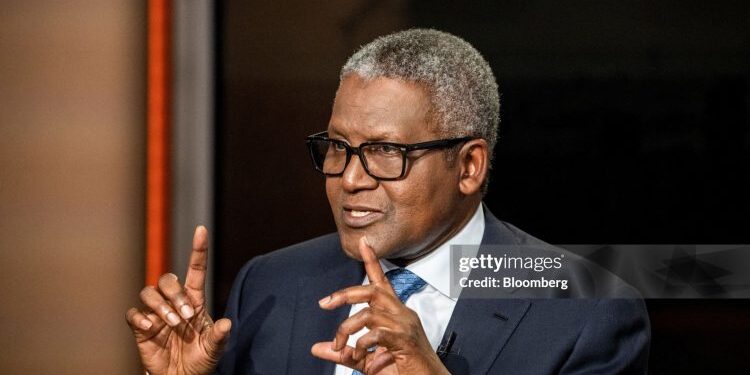Dangote Exposes Black Market Fuel Cartels Undermining Refinery Development in Africa
Africa’s richest man, Aliko Dangote, has raised concerns over the growing influence of black market fuel cartels operating in offshore waters across Africa and their destabilising impact on refinery development in the region.
Speaking at the Global Commodity Insights Conference on West Africa organised by the Nigerian Midstream and Downstream Petroleum Regulatory Authority in partnership with S&P Global in Abuja, Dangote warned that these shadow networks are undermining efforts to build local refinery infrastructure by manipulating prices and supply chains with emphasis on the maritime fuel trade centered around Lome, Togo.
He explained that international traders have long exploited the lack of refining capacity in Africa by storing and selling imported refined petroleum products offshore at inflated prices.
“The market is a uniquely African phenomenon,” he said. “International traders maintain floating storage of about two million tonnes of petroleum products just offshore. These were being sold at inflated prices, given the lack of local refining capacity. Immediately, the Dangote Refinery became operational, they decided to crash the prices.”
Dangote argued that the move was deliberate. “Make no mistake, those who profit from this system will do everything they can to prevent other refineries from emerging.”
“The whole essence of Lome is to ensure that no refinery operates in Sub-Saharan Africa. In fact, I don’t see any new major refining project succeeding with the offshore Lome market in existence.”
He warned that these shadow networks manipulate supply chains and undercut prices, ultimately deterring investment in large-scale refining infrastructure. “We cannot continue to allow a parallel oil economy to dictate the fate of Africa’s energy self-sufficiency,” Dangote said.
Dangote’s comments come amid renewed efforts by African leaders to attract private capital into local refining infrastructure in order to reduce dependency on foreign fuel imports and retain more value within the continent.
Despite efforts to expand refining capacity, Nigeria and other West African nations still import nearly 69% of their gasoline, according to Farouk Ahmed, head of Nigeria’s Midstream and Downstream Petroleum Regulatory Authority.
In 2025, West Africa trades approximately 2.05 million metric tonnes of gasoline each month, yet only 31% is supplied by local refineries.
Despite the region’s position as a major hydrocarbon producer and a growing refining hub, it continues to depend heavily on fuel imports from Europe, the Middle East, and Asia.
Africa’s push for fuel self-sufficiency is driven by strategic reforms, infrastructure investments, and policy changes aimed at reducing reliance on imported petroleum products.
Aliko Dangote pointed to a major challenge undermining progress: the lack of harmonised fuel standards across African countries. Unlike Europe’s unified system, each African nation maintains its own specifications.
As a result, fuel refined in Nigeria cannot be sold in nearby countries like Ghana, Togo, or Cameroon, despite similar vehicle usage.
Dangote noted this fragmentation only benefits international fuel traders exploiting price differences across markets.








